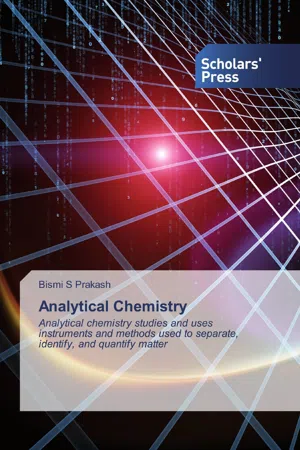
Analytical Chemistry
Analytical chemistry studies and uses instruments and methods used to separate, identify, and quantify matter
Bismi S Prakash
- 108 «pägés»
- English
- «PÐF»
- «Äväïläblé öñ ïÖS & Äñdřöïd Ü ü Ä»
Analytical Chemistry
Analytical chemistry studies and uses instruments and methods used to separate, identify, and quantify matter
Bismi S Prakash
«Äböüt Thïs Böök ö ñ»
Analytical chemistry studies and uses instruments and methods used to separate, identify, and quantify matter. In practice, separation, identification or quantification may constitute the entire analysis or be combined with another method. Separation isolates analytes. Qualitative analysis identifies analysts, while quantitative analysis determines the numerical amount or concentration. It consists of classical, wet chemical methods and modern, instrumental methods. Classical qualitative methods use separations such as precipitation, extraction, and distillation. Identification may be based on differences in color, odor, melting point, boiling point, radioactivity or reactivity. Classical quantitative analysis uses mass or volume changes to quantify amount. Instrumental methods may be used to separate samples using chromatography, electrophoresis or field flow fractionation. Then qualitative and quantitative analysis can be performed, often with the same instrument and may use light interaction, heat interaction, electric fields or magnetic fields.